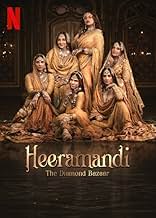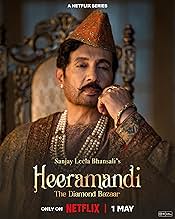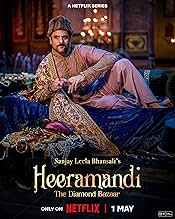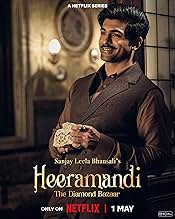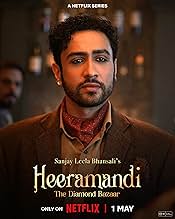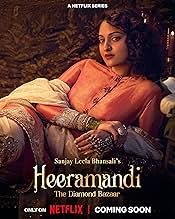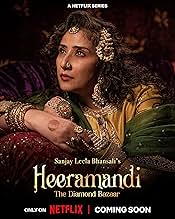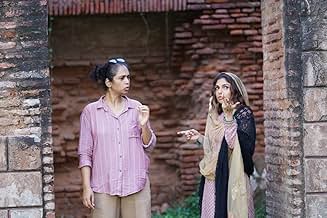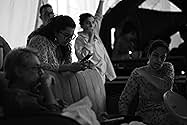Sanjay Leela Bhansali apporte sa touche majestueuse à des histoires d'amour et de trahison dans la vie des courtisanes de l'Inde d'avant l'indépendance.Sanjay Leela Bhansali apporte sa touche majestueuse à des histoires d'amour et de trahison dans la vie des courtisanes de l'Inde d'avant l'indépendance.Sanjay Leela Bhansali apporte sa touche majestueuse à des histoires d'amour et de trahison dans la vie des courtisanes de l'Inde d'avant l'indépendance.
- Récompenses
- 29 victoires et 42 nominations au total
Parcourir les épisodes
Résumé
Reviewers say 'Heeramandi: The Diamond Bazaar' is visually stunning with lavish sets and costumes, exploring themes of love, betrayal, and ambition. Manisha Koirala, Sonakshi Sinha, and Aditi Rao Hydari deliver nuanced performances. However, criticisms include uneven pacing, weak storytelling, and underdeveloped characters. Some find the plot lacking emotional depth and coherence, with debated historical accuracy. Despite its visual appeal, the series struggles with narrative execution and character development.
Avis à la une
The tale is a dreary and nonsensical affair.
The screenplay proves a tiresome, protracted bore.
The dialogue is insipid and trite.
Performances are utterly devoid of vitality.
The production values, however, are quite lavish.
The locales are top-notch.
The sets and their adornments are simply splendid.
The costumes are exceptionally fine.
The makeup is rather pleasing.
Cinematography is nothing short of remarkable.
The lighting is impeccable.
Alas, the direction feels hopelessly antiquated.
Its a mixed bag of splendid visuals and dreary narration not recommended for viewing.
****4****
The screenplay proves a tiresome, protracted bore.
The dialogue is insipid and trite.
Performances are utterly devoid of vitality.
The production values, however, are quite lavish.
The locales are top-notch.
The sets and their adornments are simply splendid.
The costumes are exceptionally fine.
The makeup is rather pleasing.
Cinematography is nothing short of remarkable.
The lighting is impeccable.
Alas, the direction feels hopelessly antiquated.
Its a mixed bag of splendid visuals and dreary narration not recommended for viewing.
****4****
The series has a great cinematography with amazing sets and fine silk dresses.
Sanjay leela bhansali is great in this.
The courtesians looks faboulous.
1st 2 episodes put the show with rich content and run the show.
The story or plot seems distorted later and confuses audiences on what exactly the director wants to show.
The plot became choppy with no relevant content.
The story should circle around internal rivarly, rather than roam around british army taking some revenge.
If Plot could be far better, this show would be blockbuster.
Sonakshi's character needs to be more strong and meaningful.
Sanjay leela bhansali is great in this.
The courtesians looks faboulous.
1st 2 episodes put the show with rich content and run the show.
The story or plot seems distorted later and confuses audiences on what exactly the director wants to show.
The plot became choppy with no relevant content.
The story should circle around internal rivarly, rather than roam around british army taking some revenge.
If Plot could be far better, this show would be blockbuster.
Sonakshi's character needs to be more strong and meaningful.
My 5yr old sister can do better acting then sharmin Segal...the worst actress in the whole universe I would like to say.... HOW CAN A PERSON HAVE 0 EXPRESSION just because she is a sibling of Sanjay Leela bhansali, she got a chance for the biggest role
There can be any actress in her play and they would do better than this women
Most disappointing part is the lead female actor too disappointing she has just one expression in the whole series just 1 expression
Otherwise the series is great and watchable for people who like old periodic movies it is a glamorous series which represents the beauty of tawaifs.
The journey through the narrative landscape began with an air of anticipation and excitement, each episode unveiling layers of intrigue and promise. From the onset, the tale seemed poised to deliver a gripping saga of revenge and redemption, with Fareedan's quest for vengeance serving as the central driving force. As viewers, we were drawn into the intricate web of characters and conflicts, eagerly awaiting the resolution of the simmering tensions that lay at the heart of the plot.
However, as the story unfolded, cracks began to appear in the carefully constructed facade of the narrative. What started as a tale of personal vendetta soon morphed into something altogether unexpected and disconcerting. The introduction of Tajdar's love story initially seemed like a welcome addition, promising to add depth and dimension to the overarching narrative. Yet, as the plot progressed, it became increasingly apparent that this newfound subplot was not destined for a happy resolution.
Instead of serving as a complementary element to the main storyline, Tajdar's tragic romance became the focal point of the narrative, eclipsing the original premise of Fareedan's quest for justice. With each passing episode, the spotlight shifted further away from Fareedan's journey, leaving viewers wondering whether his pursuit of revenge had been relegated to the sidelines indefinitely.
What's more, the manner in which Tajdar's love story unfolded felt jarring and disjointed, lacking the organic flow and cohesion that characterized the earlier episodes. Scenes of tenderness and passion were abruptly interspersed with moments of heart-wrenching tragedy, leaving little room for the audience to fully invest in the emotional arc of the characters. Instead of feeling a sense of empathy or connection with Tajdar and his beloved, viewers were left feeling perplexed and emotionally disconnected, unsure of how to reconcile the sudden shift in tone and focus.
As if the abrupt departure from the original plotline wasn't disconcerting enough, the narrative took an even more bewildering turn in its final act. With only a handful of episodes remaining, the storyline inexplicably veered into the realm of patriotism, introducing themes and motifs that felt entirely out of place given the trajectory of the plot thus far. Suddenly, the central conflict shifted from the personal vendettas of individual characters to a broader, more abstract struggle for national identity and pride.
While patriotism can undoubtedly be a powerful storytelling device when wielded with skill and nuance, its sudden introduction in the eleventh hour felt forced and contrived, robbing the narrative of its authenticity and emotional resonance. What started as a tale of personal tragedy and triumph had devolved into a thinly veiled attempt at political commentary, leaving viewers feeling more bewildered than enlightened by the abrupt change in direction.
To make matters worse, the lack of a proper resolution only served to underscore the narrative disarray that had come to define the latter half of the series. Questions that had been meticulously seeded throughout the earlier episodes remained unanswered, dangling tantalizingly out of reach as the final credits rolled. What became of Fareedan and his quest for vengeance? Did Tajdar ever find peace after the untimely demise of his beloved? And what, if anything, did the sudden shift to patriotism ultimately achieve in terms of advancing the overarching themes and messages of the narrative?
As a viewer who had invested countless hours in following the twists and turns of the storyline, the lack of closure felt like a betrayal of trust. What had initially promised to be a gripping and emotionally resonant tale had devolved into a disjointed and unsatisfying mess, leaving me feeling disillusioned and disappointed by the narrative missteps that had come to define the latter half of the series.
However, as the story unfolded, cracks began to appear in the carefully constructed facade of the narrative. What started as a tale of personal vendetta soon morphed into something altogether unexpected and disconcerting. The introduction of Tajdar's love story initially seemed like a welcome addition, promising to add depth and dimension to the overarching narrative. Yet, as the plot progressed, it became increasingly apparent that this newfound subplot was not destined for a happy resolution.
Instead of serving as a complementary element to the main storyline, Tajdar's tragic romance became the focal point of the narrative, eclipsing the original premise of Fareedan's quest for justice. With each passing episode, the spotlight shifted further away from Fareedan's journey, leaving viewers wondering whether his pursuit of revenge had been relegated to the sidelines indefinitely.
What's more, the manner in which Tajdar's love story unfolded felt jarring and disjointed, lacking the organic flow and cohesion that characterized the earlier episodes. Scenes of tenderness and passion were abruptly interspersed with moments of heart-wrenching tragedy, leaving little room for the audience to fully invest in the emotional arc of the characters. Instead of feeling a sense of empathy or connection with Tajdar and his beloved, viewers were left feeling perplexed and emotionally disconnected, unsure of how to reconcile the sudden shift in tone and focus.
As if the abrupt departure from the original plotline wasn't disconcerting enough, the narrative took an even more bewildering turn in its final act. With only a handful of episodes remaining, the storyline inexplicably veered into the realm of patriotism, introducing themes and motifs that felt entirely out of place given the trajectory of the plot thus far. Suddenly, the central conflict shifted from the personal vendettas of individual characters to a broader, more abstract struggle for national identity and pride.
While patriotism can undoubtedly be a powerful storytelling device when wielded with skill and nuance, its sudden introduction in the eleventh hour felt forced and contrived, robbing the narrative of its authenticity and emotional resonance. What started as a tale of personal tragedy and triumph had devolved into a thinly veiled attempt at political commentary, leaving viewers feeling more bewildered than enlightened by the abrupt change in direction.
To make matters worse, the lack of a proper resolution only served to underscore the narrative disarray that had come to define the latter half of the series. Questions that had been meticulously seeded throughout the earlier episodes remained unanswered, dangling tantalizingly out of reach as the final credits rolled. What became of Fareedan and his quest for vengeance? Did Tajdar ever find peace after the untimely demise of his beloved? And what, if anything, did the sudden shift to patriotism ultimately achieve in terms of advancing the overarching themes and messages of the narrative?
As a viewer who had invested countless hours in following the twists and turns of the storyline, the lack of closure felt like a betrayal of trust. What had initially promised to be a gripping and emotionally resonant tale had devolved into a disjointed and unsatisfying mess, leaving me feeling disillusioned and disappointed by the narrative missteps that had come to define the latter half of the series.
Never expected this meandering story from this genius. None of the characters impresses. It's a strain watching pure dialogue delivery. Boring and lacklustre characters that fail to engage.
It seems the makers just wanted to somehow stretch a story to 8 episodes. The sets and costumes will impress only when you have well fleshed characters . Sorry Bhansali ji you have disappointed us.
Too much effort of audience goes in adjusting to names and recollection of past events because the scenes are forgotten due to lack of potency. I wonder why more effort was not put in. Basic principles of scene construction were ignored.
It seems the makers just wanted to somehow stretch a story to 8 episodes. The sets and costumes will impress only when you have well fleshed characters . Sorry Bhansali ji you have disappointed us.
Too much effort of audience goes in adjusting to names and recollection of past events because the scenes are forgotten due to lack of potency. I wonder why more effort was not put in. Basic principles of scene construction were ignored.
Burning Questions With the Cast of Heeramandi
Burning Questions With the Cast of Heeramandi
Heeramandi: The Diamond Bazaar stars discuss their latest series on IMDb's Burning Questions. Sanjay Leela Bhansali's cast talks about their challenges and the most fun moments on set.
The Making of "Heeramandi: The Diamond Bazaar"
The Making of "Heeramandi: The Diamond Bazaar"
Here's an exclusive look at the creation of Heeramandi: A Diamond Bazaar. Join us as we go behind the scenes with none other than Sanjay Leela Bhansali himself!
Le saviez-vous
- AnecdotesDirector Sanjay Leela Bhansali offered veteran actress Mumtaz to be part of the series. Mumtaz declined the role citing disapproval of her husband owing to her age and the taxing demand of the character and the series.
Meilleurs choix
Connectez-vous pour évaluer et suivre la liste de favoris afin de recevoir des recommandations personnalisées
- How many seasons does Heeramandi: The Diamond Bazaar have?Alimenté par Alexa
Détails
- Durée
- 1h(60 min)
- Couleur
- Mixage
- Rapport de forme
- 2.00 : 1
Contribuer à cette page
Suggérer une modification ou ajouter du contenu manquant






